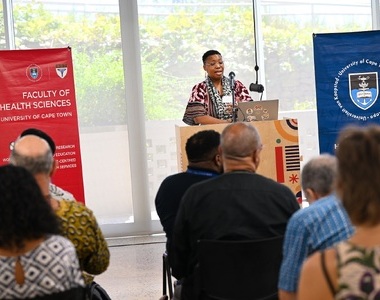‘Chart a new future for democracy’
06 September 2019 | Story Niémah Davids. Photo Je’nine May. Read time 4 min.
“As Africans, we need to be active, conscious citizens to stand for the principles of freedom,” University of Cape Town (UCT) chancellor, Mrs Graça Machel, told delegates at the start of the Democracy in Central and Southern Africa Conference this week.
Organised by UCT’s Nelson Mandela School of Public Governance in partnership with the Kofi Annan Foundation, the two-day event unpacked solutions to the challenges that threaten democracy in Central and Southern Africa, interrogated the role of transitional governance to strengthen advocates of democracy across the continent, and aimed to equip delegates with ideas and tools to reinforce and deepen democracy in their respective countries.
The conference was held at UCT’s Graduate School of Business (GSB) Conference Centre.
But day one, on Wednesday, 4 September, got off to a sombre start. It was marred by the news of UCT film and media studies student Uyinene ‘Nene’ Mrwetyana’s death and signalled a day of mourning for the UCT community and the start of a campus-wide shut down.
“As a nation we are terribly sick. We are very sick, and the attacks on women have done this.”
“As a nation we are terribly sick. We are very sick, and the attacks on women have done this,” Machel said. “The events unfolding in our country have left us all deeply disturbed. We’re left asking the question, ‘What is it that we have not been doing right?’”
Democracy faces universal challenges
In her keynote address, Machel told the audience that democracy in the Central and Southern African region faces serious and widespread challenges.
She explained that this was demonstrated in a recent survey conducted by Afrobarometer, in which only 43% of African respondents indicated that they are satisfied with the state of the democracies in their respective countries. Furthermore, the same survey also stated that only 34% feel that they live in a democracy.
“This is in contrast with the optimism felt across this region and the world 25 years ago when Madiba became the first black president of a multiracial, democratic South Africa.”
“It’s also a glaring indictment of our politicians, institutions and instrumental government and democracy,” she said.
Change is possible
Change is always possible, Machel added. And it starts with global action and solidarity.
“History teaches us that change is possible when courageous women stand together,” she said.
“We need all types of change agents. Not one country overcame tyranny without support from its neighbours.”
She encouraged the audience to take responsibility to help effect that change in their families, communities and in their countries, and to lend a hand to their struggling neighbours. And if something doesn’t work, Machel urged the group to speak out.
“We need all types of change agents. Not one country overcame tyranny without support from its neighbours. We need to revive that spirit today,” she instructed.
Chart a new future
That’s what democracy in Central and Southern Africa requires – a new future. And while it’s doable, it will take hard work and a collective effort.
“As Madiba said: ‘The quality of change in our society will greatly depend upon the quality of leadership that is exercised in the various sectors and activities of our communities, organisations and public life,’” she said.
She told delegates to recommit to the true principles and practices of democracy and encouraged them to use their influence and networks to “take action and root out corruption and discrimination”.
“Ensure that the values of freedom remain at the heart of public life,” she said.
In doing so, Machel said she believes the continent will become a more vibrant, peaceful, prosperous and equitable home for all to enjoy.
“Let us not fail ourselves. We can’t afford to be complacent. [Let’s] join in a spirit of unity and unwavering determination and take concerted action [for] our beautiful continent.”
 This work is licensed under a Creative Commons Attribution-NoDerivatives 4.0 International License.
This work is licensed under a Creative Commons Attribution-NoDerivatives 4.0 International License.
Please view the republishing articles page for more information.






























































































































































































































































































































































































































































